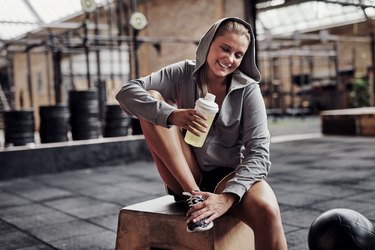
When exercising, you lose water through perspiration, so it's important to drink water after a workout. The water loss increases if the physical activity is done outdoors in hot, humid weather. To maintain hydration, experts advise drinking water before, during and after exercise. Although, there are no clear benefits of drinking hot water before exercise instead of cold water.
Tip
You should drink water after exercising to avoid dehydration.
Video of the Day
How Much Water to Drink
According to the American Academy of Family Physicians (AAFP), you should drink 17 to 20 ounces of water two to three hours before starting a workout. You should also consume 8 ounces of water either during your warm-up period or 20 to 30 minutes before you begin exercising. In addition, the agency advocates drinking 7 to 10 ounces of water every 10 to 20 minutes during a workout, as well as 8 ounces of water no later than 30 minutes after your workout ends.
Video of the Day
Even when you aren't exercising, the body continually loses water. Therefore, the National Academies of Science, Engineering and Medicine recommends daily water consumption from beverages and food of 2.7 liters (91 ounces) for women and 3.7 liters (125 ounces) for men.
What About Other Beverages?
Water will keep most people adequately hydrated. However, for those who exercise longer than an hour at a high level of intensity, AAFP suggests a sports drink may be beneficial. Such beverages contain potassium, calories and other nutrients that boost energy and help maintain electrolyte balance. Choose sports drinks carefully, avoiding those with caffeine and a high content of salt and sugar.
Take care not to confuse energy drinks with sports drinks. Energy drinks don't replace electrolytes, and they contain caffeine and other stimulants, states Mayo Clinic. The National Center for Complementary and Integrative Health warns that these beverages' high caffeine content may cause serious heart and blood vessel disorders.
Read more: Dehydration and Water Vs. Gatorade
Why You Need Water
Water, your body's chief component, comprises 60 percent of your body weight, says the Mayo Clinic. It's essential for the proper functioning of every tissue and cell. Water's many physiological actions include maintaining body temperature, lubricating joints and removing wastes through perspiration and urination.
When you exercise, the movements of your muscles generate heat, explains the Cleveland Clinic. To keep your temperature at a normal range, your body gets rid of heat through perspiration. As sweat evaporates, tissues cool. Large amounts of perspiring during exercise and heat reduces the body's water supply. Drinking enough water after a workout can prevent dehydration.
Symptoms of Dehydration
You can lose more than a quart of water during one hour of exercise, states the American Council on Exercise (ACE). If you lose more water than you drink, dehydration occurs.
AAFP lists the following symptoms of dehydration: nausea, vomiting, dry mouth, dizziness, light-headedness, muscle cramps, fast heart rate and a lack of sweating. Signs of severe dehydration, which is a medical emergency, involve weakness, mental confusion and a loss of consciousness. If you experience these symptoms, go to an emergency room for immediate medical attention.
There are no disadvantages of drinking water during exercise. Indeed, it can prevent a life-threatening event.
Post-Workout Advice
Aside from drinking water, experts at the Cleveland Clinic note that you should eat after a workout because it will help foster repair and recovery. They suggest having a meal containing a mix of carbohydrates and protein within 30 to 60 minutes. Good carbohydrate sources include whole wheat bread, brown rice and fruit; while good protein sources include beans, nuts, eggs, fish and poultry.
Read more: The 9 Best Post-Workout Foods
It's also best to avoid alcohol after a workout. Although some people like to have a beer after an exercise or athletic training session, a February 2014 study published in Plos One found such beverages impair recovery time.
- FamilyDoctor: "Hydration for Athletes"
- ACEFitness: "Healthy Hydration"
- National Academies of Science, Engineering and Medicine: "Dietary Reference Intakes: Water, Potassium, Sodium, Chloride, and Sulfate"
- Mayo Clinic: "Water: How Much Should You Drink Every Day"
- National Center for Complementary and Integrative Health: "Energy Drinks"
- Cleveland Clinic: "Dehydration"
- Cleveland Clinic: "The Best Ways to Fuil Your Workouts Might Surprise You"
- Plos One: "Alcohol Ingestion Impairs Maximal Post-Exercise Rates of Myofibrillar Protein Synthesis Following a Single Bout of Concurrent Training"